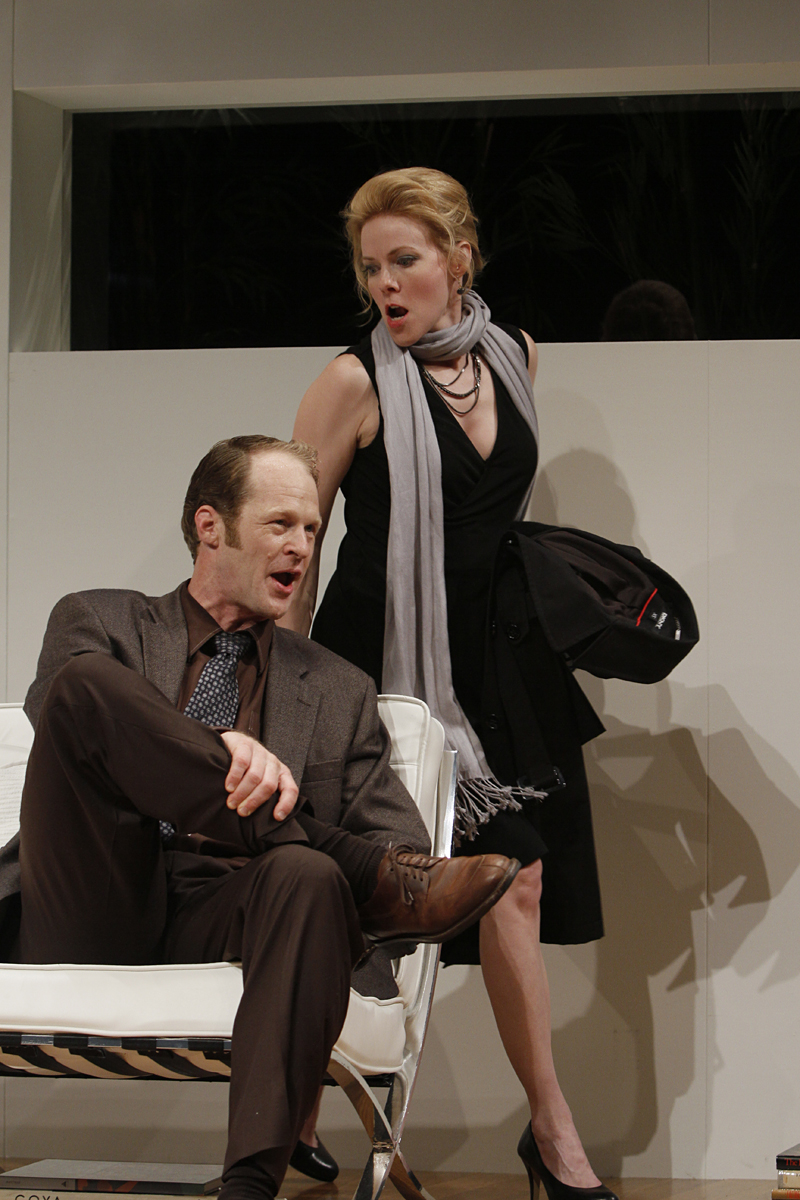If French playwright Yasmina Reza has it right, most of us are cesspools of bile thinly contained in fragile skin, simmering until prodded, then prone to exploding all over the living room. Or someone else’s living room. Which is to say, all over that great big metaphorical living room that is polite society. The Rep’s production of Reza’s 2009 Tony Award-winning play serves up a glamorous world of money, education, art, and beauty, then smashes it to smithereens. The cast’s precise, bell-clear comic timing, both physical and vocal, renders almost every beat a hoot. It’s a cathartic delight watching Eugene Lee’s sleek set devolve into the messy, filthy, putrid canvas of Reza’s vision.
Two couples meet Camp David-style in the living room of the Novaks, Michael (Hans Altweis) and Veronica (Amy Thone), to discuss how their 11-year-old son was hit and “disfigured” by his schoolmate, the son of the Raleighs, Alan (Denis Arndt) and Annette (Bhama Roget). What starts out as a prim fact-discovery exercise abruptly turns personal over the semantics of the incident. Was the supposed assailant “armed” or “furnished” with a stick? Harmony is further undermined by lawyer Alan’s frequent cell-phone calls, Michael’s callous treatment of a hamster, anthropologist Veronica’s holier-than-thou liberalism, and trophy wife Annette’s possibly strategic vomiting episodes.
Reza and director Wilson Milam take us on an elegantly incremental descent into the savagery of privileged people who abhor genocide in Darfur, yet whose livelihood may depend on defending dangerous pharmaceuticals. Not that the four characters are morally equivalent—Alan seems particularly impeachable as he casually helps himself to more clafoutis while his wife retches. (Meanwhile their hosts make hilarious attempts to save their beloved belongings from the puke onslaught.) Yet by the end of the evening, Reza ensures that everyone’s warts are on display.
Debts to Albee are striking, particularly to the setup and tone of Who’s Afraid of Virginia Woolf? and the physicality of The Marriage Play. As the “straighter” of the two couples, real-life spouses Thone and Altwies have an organic chemistry that helps smooth over the implausibility of the Novaks’ marriage (she’s an intellectual, he’s a “Neanderthal” toilet salesman). In toothsome contrast, Arndt and Roget project the opposite of chemistry—a sort of majestic insolubility. The Raleighs’ narcissism becomes a demonic force that tests the Novaks’ house of reason and compromise. As with the most seductive of villains, there’s an eloquent beauty to Alan’s amoral logic. “Madam, our son is a savage,” he says. “To hope for any kind of spontaneous repentance would be fanciful.” And later, “I believe in the god of carnage. He has ruled, uninterruptedly, since the dawn of time.” And so he probably will until the end of it.








